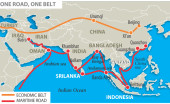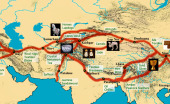Johannah Bernstein post: "eternally proud of my father’s extraordinary aeronautical engineering. legacy. here is a photo of the Canadair Water…
The Cognitive Age, David Brooks
Written by Diana Thebaud Nicholson // May 2, 2008 // Economy, Globalization, Public Policy, Trade & Tariffs // 1 Comment
The globalization paradigm has led, in the political arena, to a certain historical narrative: There were once nation-states like the U.S. and the European powers, whose economies could be secured within borders. But now capital flows freely. Technology has leveled the playing field. Competition is global and fierce.
New dynamos like India and China threaten American dominance thanks to their cheap labor and manipulated currencies. Now, everything is made abroad. American manufacturing is in decline. The rest of the economy is threatened.
The globalization paradigm has turned out to be very convenient for politicians. It allows them to blame foreigners for economic woes. It allows them to pretend that by rewriting trade deals, they can assuage economic anxiety. It allows them to treat economic and social change as a great mercantilist competition, with various teams competing for global supremacy, and with politicians starring as the commanding generals.
But there’s a problem with the way the globalization paradigm has evolved. It doesn’t really explain most of what is happening in the world.
Globalization is real and important. It’s just not the central force driving economic change. Some Americans have seen their jobs shipped overseas, but global competition has accounted for a small share of job creation and destruction over the past few decades. Capital does indeed flow around the world. But as Pankaj Ghemawat of the Harvard Business School has observed, 90 percent of fixed investment around the world is domestic. Companies open plants overseas, but that’s mainly so their production facilities can be close to local markets.
The central process driving this is not globalization. It’s the skills revolution. We’re moving into a more demanding cognitive age. In order to thrive, people are compelled to become better at absorbing, processing and combining information. This is happening in localized and globalized sectors, and it would be happening even if you tore up every free trade deal ever inked.
The globalization paradigm emphasizes the fact that information can now travel 15,000 miles in an instant. But the most important part of information’s journey is the last few inches — the space between a person’s eyes or ears and the various regions of the brain. Does the individual have the capacity to understand the information? Does he or she have the training to exploit it? Are there cultural assumptions that distort the way it is perceived?
The globalization paradigm leads people to see economic development as a form of foreign policy, as a grand competition between nations and civilizations. These abstractions, called “the Chinese” or “the Indians,” are doing this or that. But the cognitive age paradigm emphasizes psychology, culture and pedagogy — the specific processes that foster learning. It emphasizes that different societies are being stressed in similar ways by increased demands on human capital. If you understand that you are living at the beginning of a cognitive age, you’re focusing on the real source of prosperity and understand that your anxiety is not being caused by a foreigner. Complete New York Times Column




One Comment on "The Cognitive Age, David Brooks"
Hi Diana,
Thanks for Brooks. What he writes is perceptive. Put this together with the High School drop-out rates in Quebec, and it gives you a picture of where we are headed. Cheers! Tony
Antal Deutsch, Professor of Economics